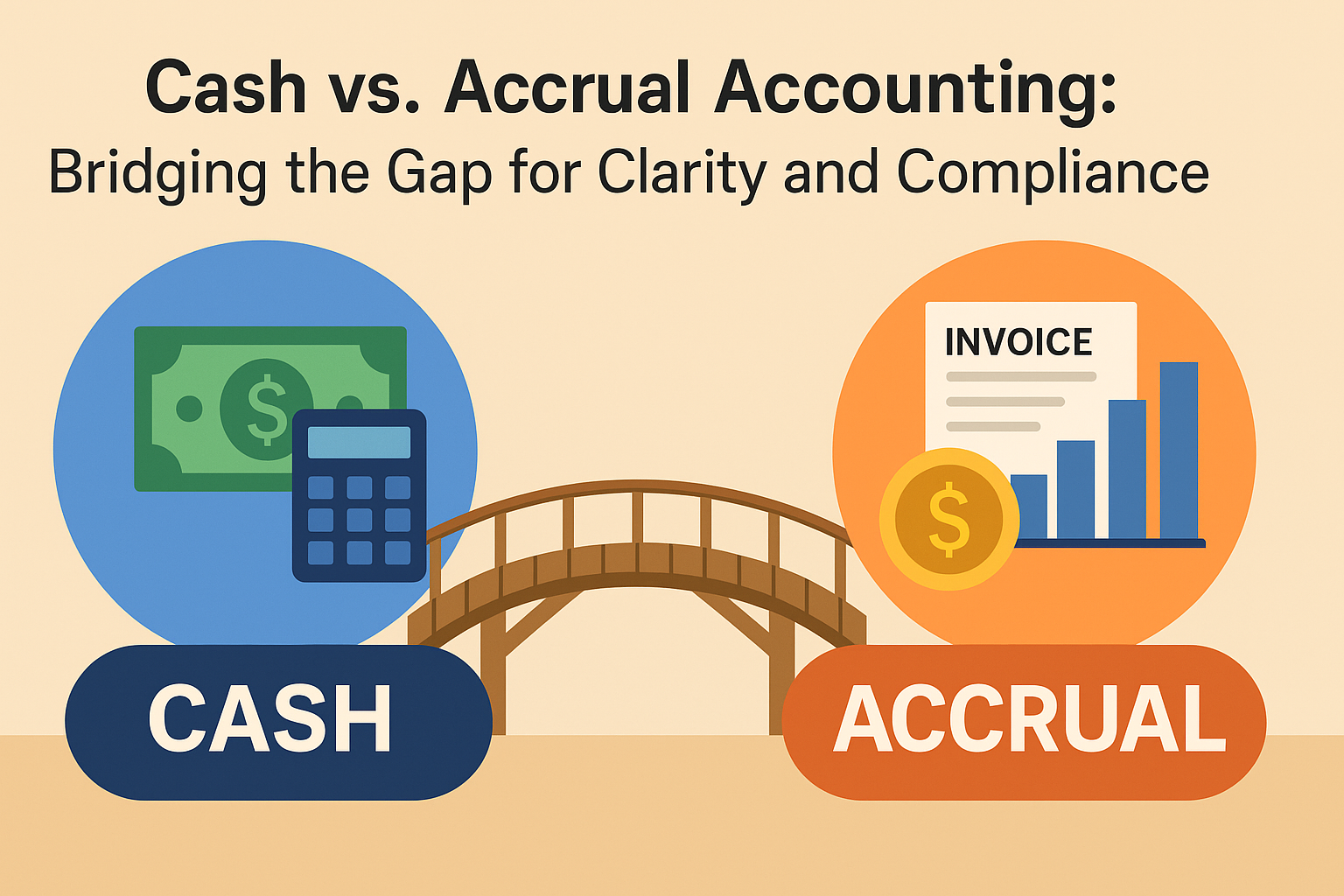Cash vs. Accrual Accounting: Bridging the Gap for Clarity and Compliance
One of the earliest—and often most confusing—decisions a business owner must make is choosing between cash and accrual accounting. Though it may seem like a technicality, the choice can shape how you understand your business’s financial health and manage taxes.
Cash Basis Accounting – Simplicity and Immediate Insight
How Cash Basis Works
Cash basis records revenue and expenses only when money changes hands. For instance, if you invoice a client in May and receive the payment in June, you recognize the income in June.
Advantages of Cash Basis
- Simplicity: Easy to understand and track—ideal for solopreneurs or small businesses.
- Clear Cash Picture: Your books reflect your actual bank balance.
- Tax Flexibility: You can delay income or accelerate expenses to optimize tax timing.
- Cash-Flow Friendly: Helps businesses that operate month-to-month manage liquidity better.
Disadvantages of Cash Basis
- Skewed Performance: Doesn’t match revenue with the costs incurred to earn it.
- No Receivables or Payables: May lose track of pending income or liabilities.
- Non-Compliant for GAAP: Not allowed once business exceeds $25M in revenue or seeks institutional investment.
- Short-Term Focus: Can mislead on long-term financial health.
Use Case: Best for very small businesses or freelancers who operate on a cash-in, cash-out basis with minimal complexity.
Accrual Basis Accounting – Matching Income and Expenses
How Accrual Basis Works
Revenue is recorded when earned, and expenses are recorded when incurred, regardless of cash movement. This allows a more accurate financial picture aligned with operational activity.
Advantages of Accrual Basis
- Accurate Performance Tracking: Matches income and expenses to the period in which they occur.
- Better for Decision-Making: Offers a holistic view of revenue, margins, and trends.
- Necessary for Growth: Required for GAAP, loans, investors, and financial statements.
- Tracks Payables and Receivables: Improves forecasting and financial planning.
Disadvantages of Accrual Basis
- Complex Setup: Involves journal entries, reconciliation, and possibly an accountant.
- Cash Flow Confusion: Profit on paper doesn’t always mean cash in hand.
- Tax Timing: You may owe tax on income before cash is received.
- Unnecessary for Very Small Businesses: May be overkill if all payments are instant.
Use Case: Ideal for growing companies, product-based businesses, and those offering credit terms or subscriptions.
Key Differences at a Glance
Cash = When received
Accrual = When earned
Cash = When paid
Accrual = When incurred
Accrual provides Income Statement, Balance Sheet, and Cash Flow Statement.
Cash may skip the balance sheet altogether.
Cash is allowed below $25M revenue; accrual may be mandatory for inventory-holding or larger firms.
Bridging the Gap: Best of Both Worlds
- Use Accrual for Books, Track Cash Separately: Maintain a rolling cash forecast while keeping accrual books.
- Adjust Entries for Tax: Convert accrual records to cash-basis for tax filing if eligible.
- Modified Cash Basis: Hybrid method—treat inventory and capex on accrual, rest on cash.
- Modern Software: QuickBooks and others allow toggling between cash and accrual reports.
- CFO/Controller Guidance: Professionals can align your reporting and tax strategy effectively.
Illustration Example
– Invoiced in Dec, paid in Jan
– $12K cost incurred in DecCash Basis:
– December: $0 income, few expenses → low profit
– January: $20K income, $12K expenses → $8K profitAccrual Basis:
– December: $20K income, $12K expenses → $8K profit
– January: Only cash collection (no income recorded again)
Which Method is Right for You?
- Small & Simple: Cash might suffice
- Growing or Inventory-Based: Accrual is a better fit
- Seeking Loans or Investment: Accrual is a must
- Looking for Tax Flexibility: Cash can help defer taxes, if eligible
Conclusion: Achieving Clarity and Compliance
Whether you choose cash or accrual accounting, the key is to understand the strengths and limitations of each. Cash basis is great for simplicity and liquidity visibility, while accrual is vital for strategy and scale.
In many cases, a blended approach—accrual for internal reporting, cash for tax—can offer the best of both worlds. With the right tools and advisors, you can bridge the gap to make smart financial decisions while remaining compliant and tax-efficient.


